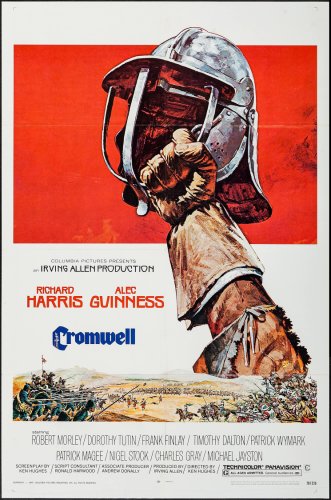

Cromwell was not one of the Members of Parliament named for arrest in the King's warrant.
Cromwell was not present in Parliament at the time the King and his troops entered the House of Commons.
When Cromwell trashes the "Catholic" golden ornaments inside the church, the priest's collar changes.
Hyde is called 'Sir Edward Hyde' and addressed by the Queen as 'my lord' in scenes which take place in 1641he was not knighted until during the Civil War and not elevated to the peerage until 1661.
Cromwell's dismissal of the Rump Parliament happened before he was offered the crown, not afterwards.
In the scene where Cromwell hangs the officer for treason in the soldier's camp, a long shot of the deceased officer's body hanging from the rope shows his mouth to be open.
A close-up of the officer's face moments later reveals that his expression has changed and his mouth is now closed.
The Battle of Naseby takes place in 1644, before the creation of the New Model Army, and Cromwell's Parliamentarian troops are heavily outnumbered by the King's Army.
In reality, the Battle of Naseby was in 1645, the Parliamentarian troops were represented by the newly formed New Model Army which had a substantial advantage in numbers (some 13,000 to the King's 7400), and Sir Thomas Fairfax, not Cromwell, was in command.
None of the cannons discharged in the battle scenes is seen to recoil.
Henry Ireton is shown heading the parliamentary deputation who offer Cromwell the crown.
Parliament's offer happened in 1657, by which time Ireton had been dead for 6 years.
Edward Hyde is shown giving evidence at Charles I's trial; the trial happened in 1649, by which time Hyde had left the country.
BAFTA Film Award |
| Best Costume Design |
Fotogramas de Plata |
| Best Foreign Movie Performer (Mejor intérprete de cine extranjero) |
Golden Prize |
| Best Actor |
It's a bit awkward to see Irishman Richard Harris spitting venom and turning against his English king for hiring on Irish mercenaries and bowing to a Catholic Queen, but he puts in a very fun performance in this little-represented section of history.The film plays its cards too soon with the pacing though, bringing us the most exciting action, scenery, battle scenes and dramatic panache early on and then ending on more of a somber courtroom whimper.
This film is well-done and the battles, military or political, are clear enough in spite of the numerous ellipses due to the extremely dense and long period covered by the film from 1640 to 1650 or so. Yet it does not really explain who Cromwell was and if he had real objectives of his own beyond his religious rhetoric.
Fed up with the rule of King Charles I (the great Alec Guinness) and with a corrupt nobility, Oliver Cromwell (a somewhat hagiographic portrayal by Richard Harris) champions parliament and ultimately leads England into a civil war. While far from a history lesson (commented on extensively in 'goofs' elsewhere - worth reading by anyone who, like me, watches the film with limited knowledge of events depicted), the film is an entertaining costume drama.
Great film buffs of English and military history, general audience, not so much. Exhaustive (and sometimes exhausting) account of the English civil war between Oliver Cromwell (Richard Harris) and the Puritan Roundheads against King Charles I (Alec Guinness).
A great piece of British history But as for acting you have Richard Harris! and Alec Guinness!
Very well filmed and acted and maybe that's the problem. The performance of Alec Guinness is sublime and makes one sympathetic towards Charles 1.
Ken Hughes's 'Cromwell', a few anachronisms aside, is surprisingly faithful to the actual history of England for a British film made before the advent of CGI, the battle scenes are also quite impressive, although the intrusive soundtrack feels very dated. Richard Harris plays Cromwell as a strident, and not particularly interesting, idealogue, an impression strengthened by his Techicolour-blue eyes.
It's 17th century England. Puritan Oliver Cromwell (Richard Harris) starts off as a loyal subject while the King (Alec Guinness) struggles to raise funds for an army to fight off the Scots.
Package for a precise message, portrait of a hero, not real interested by historical accuracy, it is one of films who impress for its details. first, it is the film of Alec Guinness who gives a splendid Charles I Stuart, fascinating lawyer of his convinces and position, one with his noble condition and giving special light to each scene.